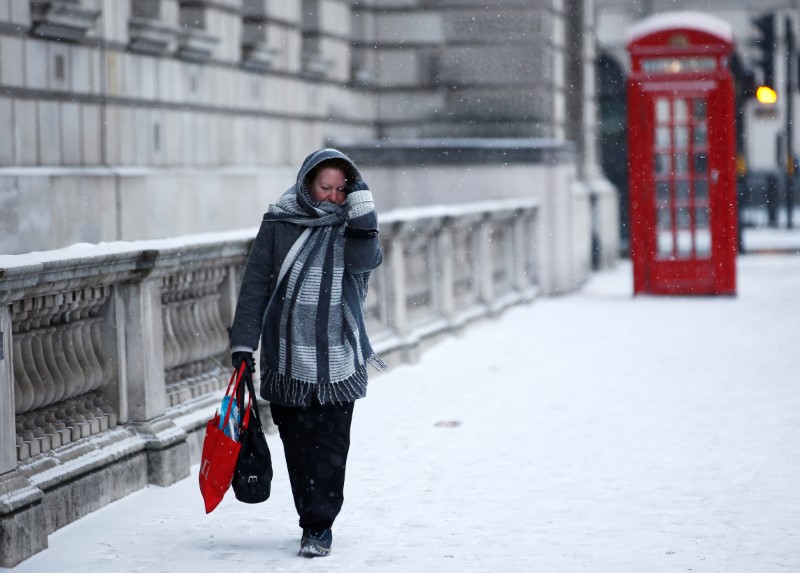By William Schomberg
LONDON (Reuters) - British consumers cut their spending by the most in more than five years in early 2018 as heavy snowfalls combined with an ongoing squeeze on household budgets to hit retailers, payments company Visa said on Monday.
Visa said inflation-adjusted consumer spending in the three month to the end of March was 1.4 percent lower than a year earlier - the biggest fall since the fourth quarter of 2012 - after a 1.3 percent fall in the fourth quarter of 2017.
Spending in March alone fell by the most since October, down 2.1 percent on the year after a 1.0 percent fall in February.
Visa said the weakness in consumer spending reflected a dip in confidence among many households as well as unusually snowy weather.
"That said, it is too early to read a great deal into this year-on-year decline, which should be viewed in the context of high growth rates in early 2017," Mark Antipof, chief commercial officer at Visa, said.
Online sales fell for the first time in 10 months. Last month online supermarket Ocado (L:OCDO) reported that its sales suffered after snow storms disrupted its deliveries.
Britain's overall economy appears to have slowed in early 2018 as the snow added to uncertainty about the country's departure from the European Union next year.
Visa said only spending on food and in hotels, restaurants and bars rose in March, probably due in part to the early Easter holiday weekend.
Official retail sales figures, due on Thursday, are also expected to show a fall in spending in March.
Figures published by the British Retail Consortium on Monday showed a 6 percent fall in the number of people visiting retailers, the biggest annual drop since the end of 2010, reflecting the bad weather.
For more than a year, British consumers have been hit by a double-whammy of slow wage growth and a jump in inflation caused largely by the pound's plunge after the 2016 Brexit vote. But there are signs that the worst of the squeeze has passed.
Official figures due this week are expected to show the strongest wage growth in nearly two-and-a-half years at 3.0 percent in the three months to February, while inflation is forecast to have held at 2.7 percent, according to a Reuters poll of economists.
That would represent the first time that wages have grown more strongly than inflation since March of last year.
The Bank of England is expected to raise interest rates next month for only the second time since the start of the global financial crisis more than 10 years ago, due in large part to signs that wage growth is picking up.

Visa's data is based on spending on its debit, credit and prepaid cards, which account for about a third of consumer spending. The growth rates are adjusted for inflation, seasonal effects and differences between typical card and cash spending.